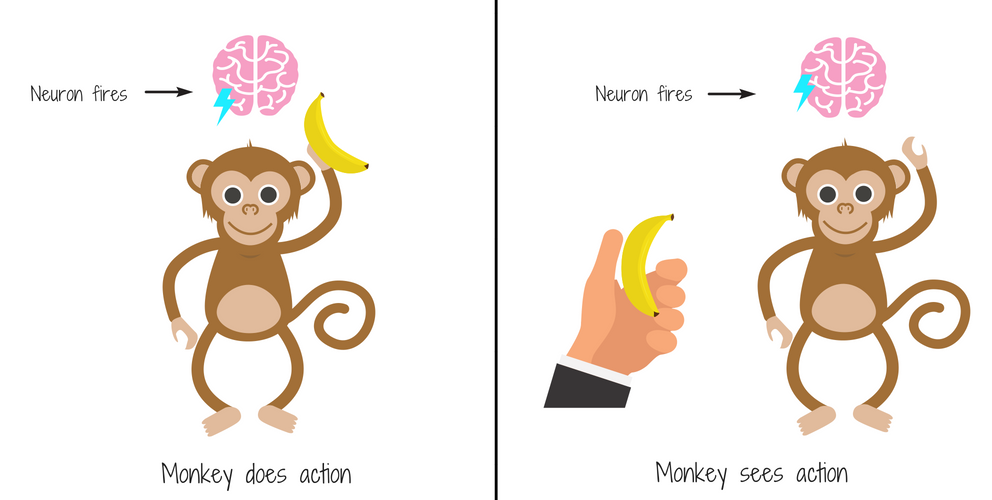
What are mirror neurons?
After observing the brain activity of monkeys and extensive research, scientists discovered that, when performing certain activities, particular neurons are activated. Aside from that, they discovered that the same neurons are also activated in those monkeys that are merely observing the activities. The neurons activated by observing the action activate identically as if the body was actually performing the action. This type of activation is not only related to physical actions but also to emotions, as observing other people’s emotions activates the same centers in our own brains. Thus, we can notice that there is a strong connection between mirror neurons and our capability to show empathy.
It is considered that, aside from helping us acquire skills that can be adopted through observation and imitation, mirror neurons also affect interpersonal understanding and social skills. Thanks to them, we can easily connect with other people and understand how they feel, without them having to explain it to us. In 2000, the renowned neuroscientist and author Vilayanur Ramachandran stated that “mirror neurons will do for psychology what DNA has done for biology”.

Mirror neurons and leadership
While doing research for his book “The Future Leader”, Jacob Morgan interviewed over 140 CEOs on leadership. He discovered that no two answers were the same when he asked them about their idea of leadership. More than 140 people answered differently and everyone had a different vision of leadership, which brings us to the conclusion that every organization has its own understanding of leadership and that the leadership in those organizations should be adapted to their own culture and needs. However, some of the demands of leadership are ubiquitous, e.g., that leadership is a vessel for influencing other members of the organization and guiding them to their goals. I do not particularly like this definition, especially because it seems to me like leadership is presented as a manipulation of others; in some cases, it probably is. However, in this article, I would like to focus on the potential of leadership and the organizations that use leadership for the right causes – those that see leadership as a kind of magic that facilitates success.
Aside from the countless definitions of leadership and different interpretations of the term, this much is certain – a leader must know how to work with people, be empathetic, as well as possess a developed social intelligence. Social neuroscience, which studies brain activities in people while they are communicating stresses the need for a leader to be socially intelligent, as this type of intelligence is related to our capability to understand and manage our social relationships.
A good leader is someone who we very likely look up to, who we learn a lot from, and who influences us greatly. This leads me to the fact that leaders need to be aware of how much they influence other people. How many times was our day or mood ruined by a team leader just because they were in a foul mood? On the other hand, we are aware that a leader’s good mood can positively influence team members who, as a result, are more creative and open, less stressed, and perform their tasks more easily. It is evident that the leader’s behaviour affects both the team and the business.
Neuroleadership is a branch of science that explores the neural basis of leadership while taking into consideration the physiology and the functioning of the brain, by taking data from various domains of neuroscience. This area is fairly new – the term was coined by dr. David Rock in 2006. Neuroscience teaches us that mirror neurons are not grouped in a single part of the brain, but that they rather form a network in various parts of the brain. Leaders who communicate with people can understand their emotions and intentions by observing their facial expressions and tone of voice; without this ability, we can hardly call someone a successful leader. Empathy is essential if leaders wish to be trusted.
Thus, on one hand, mirror neurons help us better understand and empathize with people, and on the other hand, they help us learn through imitation and observation. This is why I believe that leaders must be aware of their appearance and actions; it is evident that those who follow them will learn from them with the help of these neurons. Andrew Meltzoff says that babies can imitate behaviour as early as two to three weeks after being born, and it is precisely mirror neurons that help them do that. If a child observes an action, mirror neurons activate and form new neural bonds, as if the child performed it.
As we already mentioned, mirror neurons are activated when we are in contact with other people, which is why I recommend that all leaders, and all who wish to become leaders, to every once in a while (weekly, if not more often) pay more attention to their colleagues. People can tell us surprisingly much without using their words. Also, I would once again like to remind you of the importance of self-awareness when it comes to the actions and behaviours of leaders. If you have the opportunity to occupy such a significant and influential position, use it wisely and carefully.
Author: Ana Sionov, HR Manager
You may also like

Streamline your Workflow with Spreadsheet
July 19, 2024

Mastering Business Development in the IT industry: Essential Tips and Tricks
April 10, 2024

From the Code to the Conference
March 7, 2024

My First Salary as the First Step Towards a Career in IT: Testimonials & Advice
December 4, 2023

Nurturing Growth Through Mentorship: Three Teams, One Name
October 9, 2023

Mirror Neurons: Do They Help Us be Better Leaders?
April 3, 2023

Saveti naših koleginica – Šta biste rekle mlađoj verziji sebe?
March 8, 2023

Cracking the Backend Code: Tips and Tricks from Our Devs
February 13, 2023

Project Valhalla – “Codes like a class, works like an int.”
January 26, 2023

Mitovi o psihoterapiji
January 20, 2023






